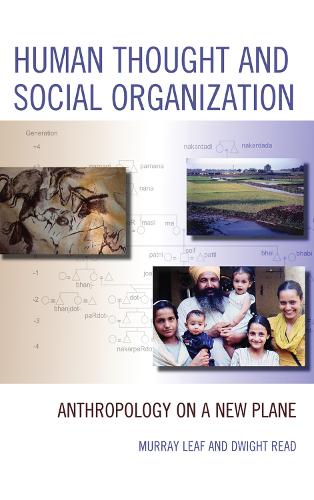
Human Thought and Social Organization: Anthropology on a New Plane
(Paperback)
Publishing Details
Human Thought and Social Organization: Anthropology on a New Plane
By (Author) Murray J. Leaf
By (author) Dwight Read
Bloomsbury Publishing PLC
Lexington Books
12th June 2014
United States
Classifications
Tertiary Education
Non Fiction
Relationships and families: advice, topics and issues
Social classes
301
Physical Properties
Paperback
476
Width 154mm, Height 227mm, Spine 28mm
748g
Description
Human beings have two outstanding characteristics compared to all other species: the apparently enormous elaboration of our thought through language and symbolism and the elaboration of our forms of social organization. The view taken in Human Thought and Social Organization: Anthropology on a New Plane is that these are intimately interconnected. To understand this connection, the book compares the structure of the systems of thought that organizations are built upon with the organizational basis of human thinking as such. An experimental method is used, leading to a new science of the structure of human social organizations in two senses. First, it gives rise to a new kind of ethnology that has the combination of empirical solidity and formal analytical rigor associated with the paradigmatic sciences. Second, it makes evident that social organizations have distinctive properties and require distinctive explanations of a sort that cannot be reduced to the explanations drawn from, or grounded in, these other sciences. Human social organizations are created by people using systems of ideas with very specific logical properties. This book describes what these idea-systems are with an unbroken chain of analysis that begins with field elicitation, and continues by working out their most fundamental, logico-mathematical generative elements. This enables us to see precisely how these idea systems are used to generate organizations that give pattern to ongoing behavior. The book shows how organizations are objectified by community members through symbolic representations that provide them with shared conceptions of organizations, roles, or relations that they see each other as participating in. The case for this constructive process being pan-Homo sapiens is described, spanning all human communities from the Upper Paleolithic to today, and from the most seemingly primitive Australian tribes to modern-day America and India. While focusing primarily on kinship, Human Thought and Social Organization shows how the analysis applies with equal precision to other social areas ranging from farming to political factionalism.
Reviews
Continuing their collaboration, in this book Leaf and Read provide the view of kinship organizations underlying cognitive processes and then lay out their formal analysis of kinship terminologies that should transform the field into a bona fide science equivalent to theoretical physics. It is a volume of formidable scope and clarity of exposition....This book has potentially a very wide readership and should...be on the list of cultural anthropologists, evolutionary ecologists, archaeologists, linguists, psychologists, and applied anthropologists. * Anthropos *
Read and Leaf, in this highly stimulating book, present a novel, coherent theory about the co-evolution of human thought and language on the one hand, and human social organization on the other. They do so by shifting the perspective from cognitive development essentially happening within the human mind, to viewing it as driven by people's interactions with the outside material, environmental, and social worlds. In doing so, they bring us a much more coherent and comprehensible history of human cognitive evolution than any I have seen thus far. -- Sander van der Leeuw Ph.D, Arizona State University
This book by Murray Leaf and Dwight Read is both brilliant and revolutionary. It puts socio-cultural anthropology in a context that understands human social behavior as cognitively governed, i.e., not generated by ideas but rather made interpretable, and therefore interactive, by mental rules. These rules of conceptual government finally allow serious algebraic-mathematical analysis of social-cultural behavior and idea systems as formal science properly grounded in relevant technical philosophy in a genuine evolutionary framework. -- F. K. Lehman, University of Illinois at Urbana-Champaign
Murray Leaf and Dwight Read propose a new theoretical outlook for anthropology even a new science, as announced in the introduction. Human thought and Social Organization touches upon an ambitious range of topics, from cognition in the Upper Palaeolithic to kinship algebra and communication theory. Its wide array of subjects is also likely to appeal to scholars working in cultural evolution or cognitive anthropology, and especially to those embracing a formal-mathematical approach to social phenomena. * Journal Of The Royal Anthropological Institute *
Author Bio
Murray J. Leaf is professor of anthropology and political economy at the University of Texas at Dallas and author of several books, including Human Organizations and Social Theory. Dwight W. Read is distinguished professor of anthropology at the University of California, Los Angeles. He is author of Artifact Classification: A Conceptual and Methodological Approach.
